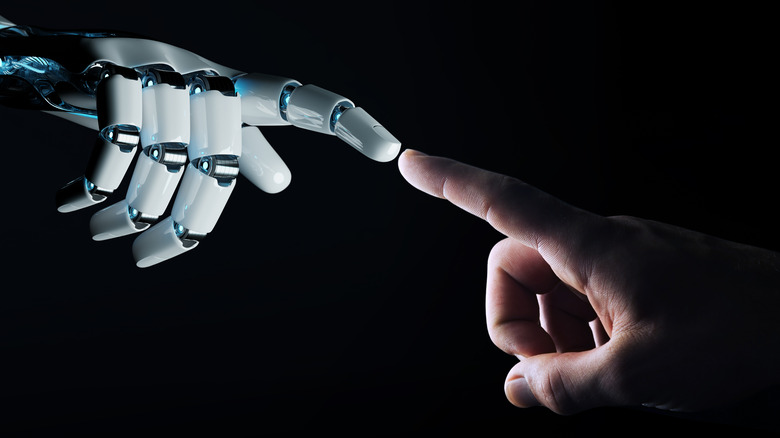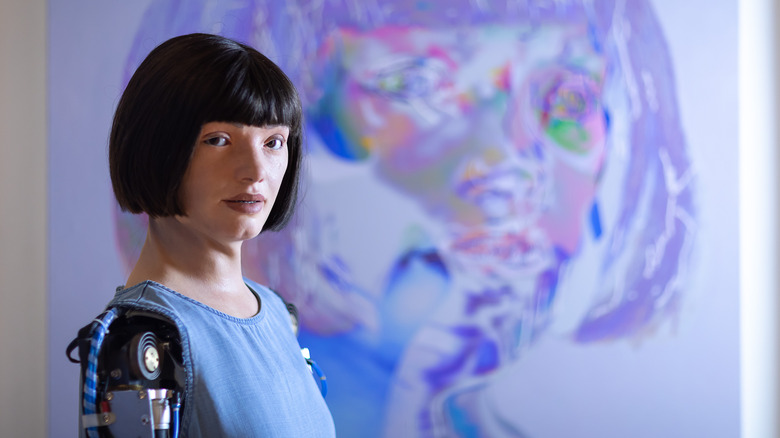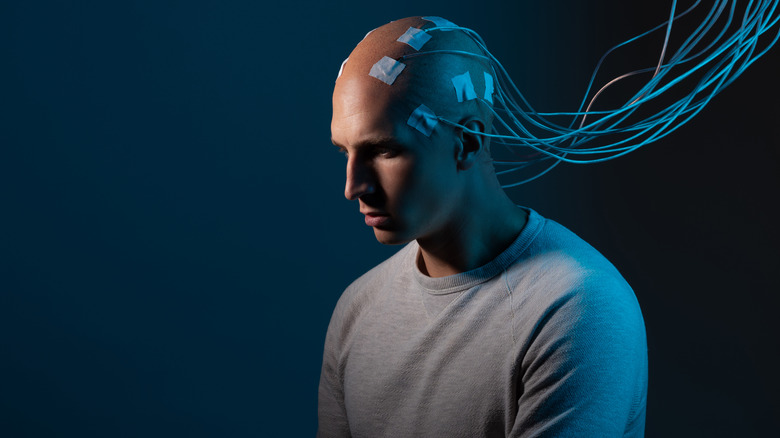The Theory That Humans And Machines Will Become One Explained
At this point, we've all been inundated with countless depictions of "man-vs-machine" narratives in popular media. The "Terminator" franchise featuring killer robots from the future, the "Blade Runner" universe about Turing-tested "skin jobs" lurking among humanity, the "Matrix" films showcasing man-in-the-machine simulation theory: The list just goes on and on, across literature, films, video games, and more.
Such fears have roots in the Industrial Age at the end of the 1800s. Amid rapid societal change, folks grew ever more afraid of humans becoming "mechanized," subject to technological dependency and the loss of what it "means to be human." Early, groundbreaking films like "Metropolis" (1927) depict this fear perfectly, where humanity becomes subservient to a steam-and-soot industry of power-mad capitalists and god-like machines.
"Transhumanists," though, would say that humanity and machines are destined to fuse, and such fusion should be embraced. The term "transhumanism" was coined back in the 1950s by biologist Julian Huxley, brother to famed author Aldous Huxley, who wrote "Brave New World" (1932). Huxley published "Transhumanism" in 1968 in the Journal of Humanistic Psychology as a sort of rousing call-to-action for humanity to embrace its destiny as masters of fate and explorers of the stars (available in full on Research Gate). It's stuffed with grandiose sentiments about "great men" and humanity needing to "prepare itself for the cosmic office to which it finds itself appointed." And yet, the paper shows that transhumanism tackles issues much deeper than simplistic, binary "man-vs-machine" narratives, down to the core of human identity.
More human than human
Transhumanism, at its heart, is about exploring what it means to be "human," as Oxford Professor of Applied Ethics Nick Bostrom writes in his essay "Transhumanist Values." Is "human" some kind of ineffable, changeable essence? Or is "human" a state of clearly defined, static biology? Fans of sci-fi can raise their hands at this point and cite a single, clear example: Data on "Star Trek: The Next Generation" was an android who was more compassionate, endearing, and kind than most people. He was, in other words, "the most human," regardless of whether or not his guts looked like circuits.
On the flip side, if you say "a human is a member of the species Homo sapiens made of flesh and blood that walks on two legs, uses language, makes tools," and so on, you run into immediate problems. What about people with severe physical deformities? What about those with artificial limbs? Start removing limbs one by one: When does the person stop being human? How about if nothing biological remains? What if her consciousness is copied into a box? Is she still "human"?
The "human = biology" perspective connects — unfortunately so — with the brand of "social Darwinism" that links to what Hitler might have called "the superior races," as the journal BMC Med Ethics (posted at the U.S. National Library of Medicine) relates. It's a shameful offshoot of the natural sciences. Researchers in the mid-1800s observing gorillas, baboons, orangutans, and such, thought, "Hey, we've got to be different from them, right?"
Shaped by tools and tech
One way to talk about transhumanism is to talk about "enhancing" ourselves: neurological plug-ins to connect doctors to surgical machines across the world, memory-enhancing drugs to help a student get into college, exoskeletons to help soldiers carry heavy supplies behind enemy lines, that sort of thing. But aren't such advancements simply called "technology"? Or more fundamentally, "tools"?
The fact is, as The Guardian wisely points out, humans have been artificially controlling our bodies since day one. Anytime someone straps on a pair of sneakers, uses a hearing aid, has a cup of coffee, or does anything else that alters the body's innate physiology or neurochemistry, they're engaging in a "transhumanist" action. It's not "natural" for a person to do anything besides walk around naked, collecting tubers and biting into them raw before sleeping on the ground, right? But very few people would say that wearing shoes makes someone not human. So where is the line?
One possible, somewhat embarrassing answer is: The line is physical appearance. If something looks "not human" enough, then our ape brains can't accept it as a person. Going back to consciousness in a box and "Star Trek: The Next Generation," the series' Peabody award-winning episode "The Measure of a Man" featured scientist Bruce Maddox wanting to experiment on the android Data. He stated, "If it were a box on wheels, I would not be facing this opposition."
Cyberpunk 'enhancements'
A lot of modern philosophers talk about transhumanism in terms of "enhancements" to the human body, a narrowed, practical way to discuss the topic moving into the near future. As The Conversations says, the "transhumanist declaration" (a continually updated document by multiple authors) states, "We favor morphological freedom — the right to modify and enhance one's body, cognition and emotions." In other words: If I want a robot arm? I should have one. Emotion-stabilizing drugs? Mine. Ocular implants that let me to spot a rice grain a mile away? Done. High on the list of "enhancements" is de-aging tech to prevent "involuntary death."
Such commodities as alterations to the human body have been at the heart of cyberpunk fiction for decades, starting with William Gibson's seminal novel "Neuromancer" (1984). It's easy to imagine: People need to purchase upgrades to implants, they grow out of old tech, they experience FOMO if their buddies have the latest enhancements but they don't, the wealthy get super enhancements and drive classism beyond any fixable level, and so on. This last point is discussed at length in the "Transhumanism: The Big Fraud — Towards Digital Slavery" in the International Physical Medicine & Rehabilitation Journal.
As philosopher Anders Sandberg points out in an interview on IAI Player, gadgets and one-time purchases always go down in price, so those kind of enhancements would likely be affordable for most people. But those requiring continual maintenance under something like healthcare coverage? Not so much.
The haves vs. the have-nots
Even beyond ethical questions about what a person ought to be "allowed" to do with his or her body, transhumanism connects to relevant economic and political issues. It might be hard to imagine 10, 20, 50 years down the line that you might ask yourself, "Does Prime Minister Abaddon support cyborg rights?" But go back far enough in time: Who foresaw the re-rise of neo-Nazism, our obsession with online personas and social media (or even their existence), echo-chambered sub-cultures like incels and Q-Anon believers, or anything else currently clogging civil discourse? Forbes estimates that augmentations will be a normal part of life by 2030.
As philosopher Anders Sandberg says on IAI Player, the usage of enhancements could radically redraw political lines. Take reductionist splits like "left vs. right" or "progressive vs. conservative" and add to it "pro-tech vs. anti-tech." Much like how some folks reject vaccines because they want "natural immunities" (never mind that all immunity is natural), there are bound to be those who outright reject transhumanistic alterations. These people would likely cling to a bygone vision of human: two legs, flesh and blood, and a do-it-under-your-own-power ethos. And this is all before the question of "designer babies" (also coming our way).
So what's the lesson here? Transhumanism is already a part of everyday life, and has been for humanity's history. Best be prepared to deal with it in a more obvious way in the very near future.




